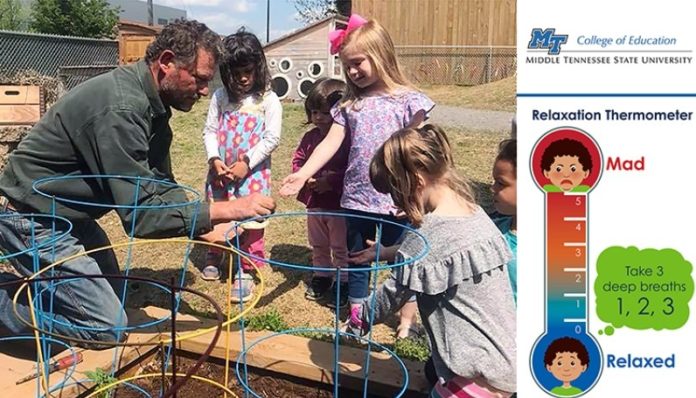
Each news brief or viral video seems more shocking than the last.
Customers barge into a newly reopened ice cream shop, bullying a frightened teenage clerk. Restaurant employees ask a belligerent patron to leave and a brawl ensues, spilling outside onto the sidewalk. A security guard stops a woman from entering a store, citing a state health law requiring face masks; she returns with family members, and the worst happens.
A new online training program for Tennessee’s prekindergarten, preschool and Head Start teachers, co-hosted by MTSU, is focusing on gentle guidance for little ones to develop social skills for school, to make friends, to learn about their emotions — and to stay out of headlines like those.
“It’s what we do as adults that children are watching and modeling, so it’s up to us to look at our practices and our behaviors and be the model for our young children so that they know how to behave as they grow,” says Connie Casha, director of Early Learning Programs for MTSU’s College of Education.
With funds from the Tennessee Department of Mental Health and Substance Abuse Services and help from early childhood specialists from the Childhood Consultation Program at Tennessee Voices and the Systems of Care Across Tennessee, the new virtual course concluded its inaugural series last week.
Demand for the new online “Pyramid Model for Social and Emotional Skills” program was so enthusiastic statewide — 180 applicants in five hours — that organizers had to make more online space available, then create a summer session and a waiting list for it, too.
“The ‘Pyramid Model’ is a framework of practices to support teachers making sure that children have appropriate social and emotional skills in the classroom,” Casha says. Her team helped bring the nationally recognized method to Tennessee schools a dozen years ago during her tenure with the state Department of Education.
“It’s our vision that this course not only provides some resources and better understanding for the participants about how they can provide safe, nurturing, responsive environments but to also form a community of learners using the Google Classroom we set up for access to additional resources and activities, as well as a way to ‘chat’ with others in the course.”
Casha and her counterparts at Tennessee Voices, Kelli Celsor and Victoria Finch, have been teaching Tennessee educators in programs like MTSU’s Ann Campbell Early Learning Center, Child Development Center and Home and Community-Based Early Intervention Program how to create good early-childhood classroom routines and expectations.
When a youngster misbehaves by, for example, hitting, yelling or refusing to follow directions, the training gives teachers tools to identify possible reasons for the conduct and help the child change it.
Casha and Celsor realized demand for the training was outpacing their schedules, so they started a pilot program online in January with five teachers. Those teachers’ feedback helped refine the interactive classroom plan.
MTSU Education Dean Lana Seivers calls the program “an excellent resource, given the times we’re in and the need to support those who care for and teach the youngest among us.”
The organizers announced their new online course in early April. Of the initial applicants, 144 participated in the full program. About half are from Middle Tennessee, and the others are split between the state’s east and west divisions.
“A lot of times teachers will sign up for this type of training and they want to know how to ‘fix’ the child or ask, ‘What’s the silver bullet?’ Well, there is no silver bullet,” Casha says. “It’s what we do as teachers that’s going to have an impact on or change a child’s behavior.
“We don’t blame a flower for not blooming. We think, ‘Does it need more light? Does it need more water, or less water? Do we need to change the soil?’ … When children don’t behave the way that we want them to behave, we have to figure out why. We have to be curious.”
The training shows teachers how to document behavior incidents and see patterns they might otherwise miss by assuming a misbehaving child “fights all day long.”
“You start to collect this data and see that … (the misbehavior) only happens three times a day,” Casha says. “So like that flower, you have to figure out: is he tired? Is he hungry? Is there another child that aggravates this child? Is it a staff person that maybe doesn’t interact well with this child?”
The information lets teachers work with very young children to learn “emotional literacy.” The adults talk about and use photos and illustrations of emotions like happiness, anger, pride and loneliness to “help them be aware of not only their own feelings but the feelings of people around them,” Casha said.
“One of the things we talk about (in the course) is that we have to teach children friendship skills just like we teach math and science and social studies and swimming. … If a child can’t use a pair of scissors, we don’t say, ‘Go sit over here. When you know how to use scissors, you can come back and join the group.’
“It’s kind of the same thing when children misbehave: we don’t want to just move them away from the group and not talk to them about that behavior. We want to teach them what they need to do.”
For more information about MTSU’s online “Pyramid Model for Social and Emotional Skills” course for early childhood educators, contact Casha in the College of Education at [email protected] or visit http://www.mtsu.edu/education.
For more information about the national training centers for the “Pyramid Model” program, visit the National Center for Pyramid Model Innovations at http://www.challengingbehavior.org and the Pyramid Model Consortium at http://www.pyramidmodel.org.















